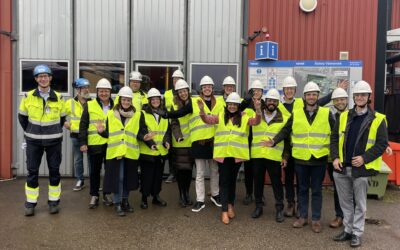Bruno Le Maire and Roland Lescure unveil an action plan to produce 1 million heat pumps by 2027 • Dalkia aims to invest €245 million in one of France’s largest district heating networks • In Grenoble, the heating company CCIAG has demonstrated the role of IoT in detecting leaks in the heating network • Read more about the developments in sustainable heating and cooling in this month's news update from France

Bruno Le Maire, the Minister of the Economy, Finance and Industrial and Digital Sovereignty, along with Roland Lescure, the Minister Delegate for Industry and Energy, have unveiled an action plan aimed at producing 1 million heat pumps in France by 2027. This announcement was made during their visit to the Intuis plant in the Somme.
The French government recognizes the potential for strengthening local heat pump production and increasing the share of French added value in this sector. They anticipate a significant rise in heat pump installations in the coming years.
To expedite the growth of the sector and maintain France’s industrial position globally, the government has outlined eight measures as part of their action plan. These measures include:
To summarize, Le Maire expresses that a transition towards an increased use of heat pumps entails many opportunities, but also that the main challenge will be to locate the brunt of the required production of heat pumps in France. Le Maire has listed several measures that have been set in motion to achieve this objective: “financing, in particular through the Green Industry tax credit, promotion of quality products, more environmentally virtuous products manufactured in our territories, simplification of standards, innovation, training and expertise.”
Read more in article from The Ministry of Finance
Following up on December’s newsletter, SHC by Sweden takes a closer look at the development of one of France’s five biggest DHC networks, covering the cities of Chambéry, La Motte-Servolex, Bassens and Cognin.
Following a competitive bidding process for the operation of the network for the next 25 years, Dalkia was selected. The new contract will start on 1 September 2024, and Dalkia has set ambitious targets to interconnect the region’s networks, providing for a significant increase of nearly 50% in the energy delivered by 2030 compared to today. They also have plans to modernize and enhance the district heating network through various measures related to heat generation, recovery, and storage within the network.
Some of the key initiatives include optimizing the utilization of waste heat from household waste recovery by Savoie Déchets, constructing a new wood-energy boiler room in Cognin, modernizing the existing wood-energy boilers in Bissy and Croix-Rouge (Hauts-de-Chambéry), recovering heat from biomass fumes emitted by three wood-fired boiler rooms, utilizing heat recovered from steam at the Placoplatre industrial plant in Chambéry, and installing a thermal storage system with a capacity of 400 cubic meters of hot water to meet peak heat consumption during mornings and evenings.
These projects collectively represent a significant investment of €245 million by Dalkia. Out of this amount, €182 million will be allocated for network development and modernization, while €63 million will be dedicated to the maintenance and renewal of the facilities.
Read more in article from Chambery
In Grenoble, the city’s heating company CCIAG is implementing a large-scale deployment of IoT sensors to detect water leaks in the district heating network. While this application is not yet widely used in the IoT, it has demonstrated significant benefits within large district heating networks.
CCIAG is the second-largest heating network operator in France. Sébastien Blanchoz, the head of the Operations and Distribution division at CCIAG, has highlighted that the piping in their network is old, leading to an increase in water leakages. Currently, CCIAG has 3,000 checkpoints to detect leaks, which takes three to four weeks to inspect. To address this issue, they are installing 500 sensors along 178.3 km of pipes located under public roads in seven municipalities in Grenoble. Additionally, they will be monitoring nearly 1,400 substations.
The search for leaks has been a long-standing concern for CCIAG, as they connect over 100,000 homes to their network, representing approximately one-third of the city’s population. Initial tests were conducted in 2012, but they were not successful due to imperfect prototypes. For example, one of the sensors offered was sealed and could not have its batteries replaced. However, a recent leak in 2023, resulting in a daily water loss of 200 cubic meters, prompted CCIAG to launch a new call for tenders and address the problem more effectively.
This project has garnered interest from other local authorities, including Metz, who have reached out to CCIAG. The market potential is significant, considering that there were 946 heating networks identified in France by the end of 2022, according to a survey by the Federation of Environmental Energy Services (Fedene).
Read more in article from Journal du Net
Read more in article from News Day FR
To stay updated on news for sustainable heating and cooling, follow us on LinkedIn, and subscribe to our Newsletter.
Sweden is at the forefront of decentralised heat networks technology. Our aim for “Sustainable Heating & Cooling by Sweden” is to facilitate knowledge sharing between British, French and Swedish stakeholders and develop and encourage environmental and economic best practice.
To find out how we can help you and your organisation, please contact our London or Paris-based “SHC” teams. We can introduce you to leading consultants, suppliers of technology and services who will be pleased to share know-how of the development of sustainable heating & cooling solutions.


